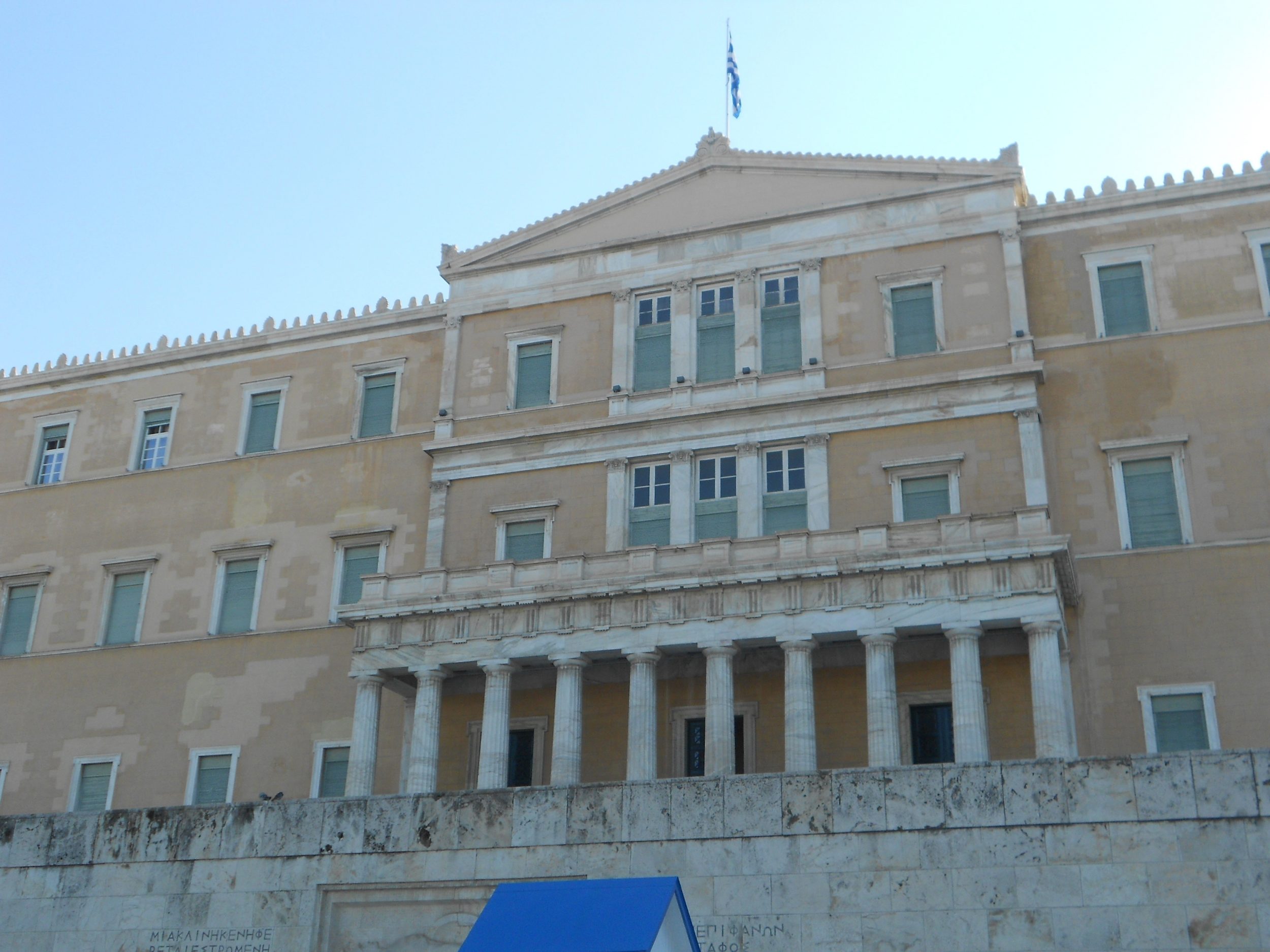For seven weeks now the Indignados of Athens have been gathering almost on a daily basis in front of the Greek Parliament in protest against the austerity measures, the rising unemployment, the deepening of the recession in the country and a proclaimed surrender of sovereignty to the mechanisms of the IMF and the European Union. Despite the fact that the movement has lost some of its original momentum in the rest of Greece, the Indignados of Athens are still occupying the front pages of domestic newspapers and the headlines of the electronic media. Journalists are quick to present romanticized images of the protesters and to expose polls put together in haste that show a high degree of sympathy and support for the movement by the wider Greek public opinion. The international media were even quicker in comparing the Indignados not only with their equivalent movements in Spain, but with the Tahrir Square protests in Egypt and the turmoil in the Middle East making ill-founded claims on the similarities of violence, the raison d’être of the movement and issues of democracy and legitimacy. So what can we make out of this movement so far?
The first protest was organized as a response to a call from Puerta del Sol, calling the Greeks to ‘wake up’. In a spontaneous manner, using the power of social networks, the movement that claimed no political affiliation or representation mobilized people from the underprivileged and often exploited strata of Greek society who may have never participated in such activism before. Yet, as the momentum of the movement grew so did the infiltration in its ranks of the organized social interest groups.
In the opinion of this author, the Indignados of Athens were transformed into a bad replica or transposition of the movement that originated in Spain (a) for different reasons and with a different purpose and (b) in-sync with similar global expressions in terms of its non-hierarchical and spontaneous organization. Nonetheless, there are important distinctions with the Greek movement that should not be overlooked and which can be crudely categorized under social, political and economic terms.
The suppression of civil society in Spain during the long and stable dictatorship of Franco has brought about a quiet democratic life, even passive at times, often manipulated under the direct threat of terrorism, with the rule of an omnipotent bipartisan system which has now led the country into a deep economic and moral crisis. The Indignados of Spain come from the younger generations—unfettered from the memories of the dictatorship—questioning the ability of the system to deliver. The manifestation of this societal expression is non-violent yet universal and dynamic, and bears no political affiliation. It is in a sense following on the footsteps of the communitarian and self-governance tradition of the pre-Franco democracy.
On the contrary, the Greek social movement has a long tradition of social struggles and demands since the interwar period; making claims for a just and fair society amidst intermittent democratic interludes, a deeply-scarring civil war, brief but fervent authoritarianism, suppression and persecution of the expression of the Left, and deep international interference with domestic affairs. This tradition has led the Greek movement to be more confrontational. Today, this movement has found a new expression in the form of the Indignados of Athens, who—similar to their Spanish counterparts—comprise members of the younger generation demanding a moral revolution and the right to a dignified living, ‘fed up’ by a model of governance that promises a lot but delivers very little (cf. blog-entry by Monastiriotis 1 July 2011).
In that way it should have been very easy to attach the label ‘Indignados’ to the protesters of Syntagma Square. Yet, what the underlying difference with the Spanish equivalent is precisely the object of delivery of this model of governance. The current financial crisis is causing a fracture in the old dynamic between the citizens at large and the paternalistic Greek state; a collapse of a system that can no longer sustain favours for certain social groups or idiosyncratically take advantage of the public purse for its own political purposes. Looking at an anthropological cross-section of the movement we do not only encounter the underprivileged sectors of society but also a number of people who represent this ‘old order’ of favouritism and the clientelistic way of doing things in public life. Some of the extreme examples of protesters (this list is not exhaustive by any means) that marred the image of this pure social reaction include amongst others:
- Tainted long-term professional trade unionists with clear political agendas and ambitions;
- Extremely young pensioners who having worked for the public sector for 15 years could file for early retirement if they had minors in the family;
- Former employees in privatized public companies (Greek telecoms, Olympic Airways et al.) who opted for voluntary resignations for a hefty compensation;
- Older public sector workers who seeing the upcoming salary harmonizations filed for retirement to secure their pensionable rights;
- Parents who managed to secure jobs in the public sector for their offsprings through party or other political connections;
- Contractors who employed uninsured Greek and immigrant workers or who more than often struck deals for overvalued and overpriced municipal public works through similar political acquaintances and family ties;
- Doctors registered in the Greek public health system who accepted bribes to fast-track patient treatment, and who at the same never provided receipts for their services in their private practices;
- So-called ‘eternal’ university students that have been registered in the higher education system for years and reaping the respective benefits;
- Tax officers who turned a blind eye to tax evasion for the right price or urban planning officers who took advantage of their authority;
- Merchants of all kinds who never produced invoices for their trade; and even farmers who were receiving long-term subsidies but were no longer in the profession.
From an academic theoretical perspective on social revolutions there should have been a breaking point in the process, a critical juncture that would lead to the toppling of the current system, identified through this spontaneous reaction of the Indignados. Yet, why has this juncture not taken place? A naïve answer would be because of the embedded guilt among those strata of society responsible for the over-exploitation of the public purse. A more realistic response though is because tension is periodically released through other means of violence—e.g. via the extreme anarchic elements taking advantage of the peaceful protesting sites.
Nonetheless, from a political perspective, the size of the protests in Athens was intended to act as a means of pressure not only to the Greek government but also to the European partners who have not been particularly responsive to the Greek crisis but have instead engaged in an endless debate within their domestic deliberations on the purpose of aid to Greece. Still, because of the very nature of this movement, the Greek government was not able to utilize its momentum as a mode of pressure within the EU. There was a peculiar absence of political affiliation in the first days of the movement that was unprecedented in Greece—it was an atypical mixture of different members of Greek society who had more individual demands, ideologies and standpoints than a collective cohesion and an end goal. They demanded a form of direct democracy without actually promoting diversity within their own group, nor a coherent set of pragmatic solutions or a formula that could be used as a basis for a counterproposal to the prospective austerity package.
For the current government the medium-term programme that was passed a couple of weeks ago amidst a commotion in the Indignados camp right outside the Parliament building (cf. blog-entry by Tsoukis 7 July 2011) was a strong test, albeit not for the unity and coherence of the government itself but rather for the thin balance between responsiveness and responsibility. The government could have easily succumbed to the pressure of the protests during the days of the debate and vote in the Parliament of the programme, responding to the demands of this ‘apolitical’ crowd, but instead the government chose the path of responsibility, namely responding to an effort to restore (a) some faith in the political system domestically and (b) the credibility and commitment required by a government that has to confront international criticism and libels.
The Indignados of Athens are responding emotionally and without political attachments to the economic demise of Greece. Yet, to the detriment of this undoubtedly important political phenomenon, the political forces in Greece, across the whole of the spectrum, from the far left to the far right, were fast to philander with this social reaction engaging in a cascade of populist arguments to attain ephemeral political support and capitalize on this transitory effervescence, each employing their own semantics to movement. If there is a waning down of the movement it is not because the protesters are not ‘indignant’ any more or because the government measures are yielding results, but rather because the Indignados managed to expose the deep social embeddedness of a malfunctioning political system.
Note:This article gives the views of the author, not the position of Greece@LSE, the Hellenic Observatory or the London School of Economics.






